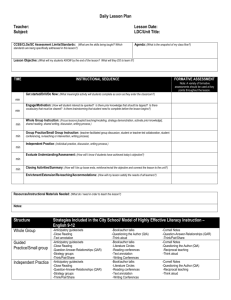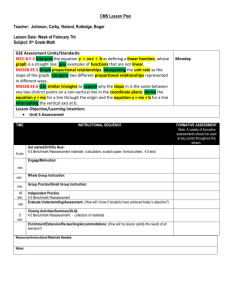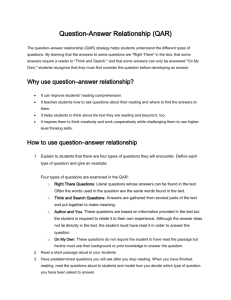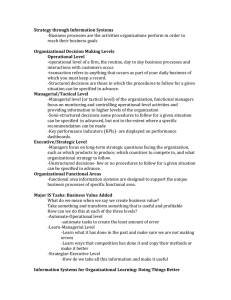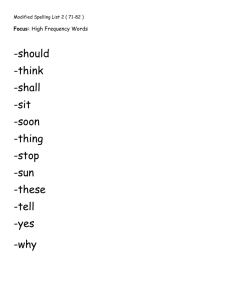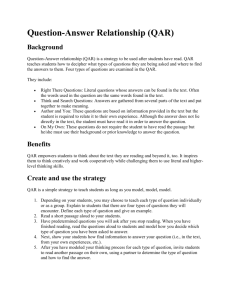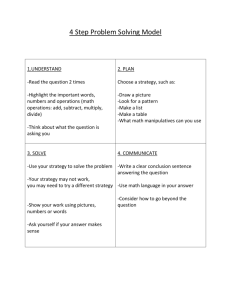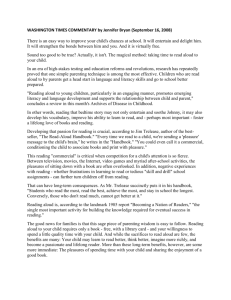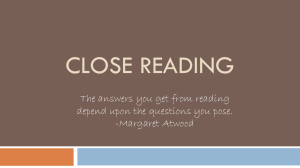to view an exemplary lesson. - Baltimore City Public School System
advertisement
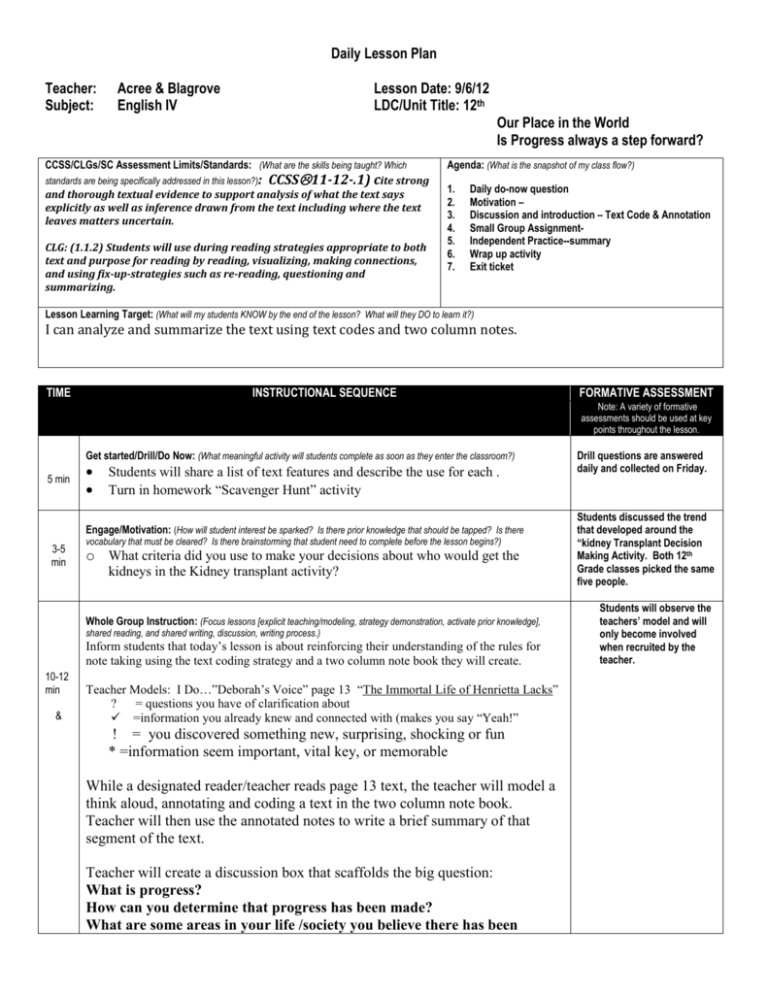
Daily Lesson Plan Teacher: Subject: Acree & Blagrove English IV Lesson Date: 9/6/12 LDC/Unit Title: 12th Our Place in the World Is Progress always a step forward? CCSS/CLGs/SC Assessment Limits/Standards: (What are the skills being taught? Which standards are being specifically addressed in this lesson?): CCSS11-12-.1) cite strong and thorough textual evidence to support analysis of what the text says explicitly as well as inference drawn from the text including where the text leaves matters uncertain. CLG: (1.1.2) Students will use during reading strategies appropriate to both text and purpose for reading by reading, visualizing, making connections, and using fix-up-strategies such as re-reading, questioning and summarizing. Agenda: (What is the snapshot of my class flow?) 1. 2. 3. 4. 5. 6. 7. Daily do-now question Motivation – Discussion and introduction – Text Code & Annotation Small Group AssignmentIndependent Practice--summary Wrap up activity Exit ticket Lesson Learning Target: (What will my students KNOW by the end of the lesson? What will they DO to learn it?) I can analyze and summarize the text using text codes and two column notes. TIME INSTRUCTIONAL SEQUENCE FORMATIVE ASSESSMENT Note: A variety of formative assessments should be used at key points throughout the lesson. Get started/Drill/Do Now: (What meaningful activity will students complete as soon as they enter the classroom?) 5 min Students will share a list of text features and describe the use for each . Turn in homework “Scavenger Hunt” activity Engage/Motivation: (How will student interest be sparked? Is there prior knowledge that should be tapped? Is there 3-5 min vocabulary that must be cleared? Is there brainstorming that student need to complete before the lesson begins?) o What criteria did you use to make your decisions about who would get the kidneys in the Kidney transplant activity? Whole Group Instruction: (Focus lessons [explicit teaching/modeling, strategy demonstration, activate prior knowledge], shared reading, and shared writing, discussion, writing process.) Inform students that today’s lesson is about reinforcing their understanding of the rules for note taking using the text coding strategy and a two column note book they will create. 10-12 min & Teacher Models: I Do…”Deborah’s Voice” page 13 “The Immortal Life of Henrietta Lacks” ? = questions you have of clarification about =information you already knew and connected with (makes you say “Yeah!” ! = you discovered something new, surprising, shocking or fun * =information seem important, vital key, or memorable While a designated reader/teacher reads page 13 text, the teacher will model a think aloud, annotating and coding a text in the two column note book. Teacher will then use the annotated notes to write a brief summary of that segment of the text. Teacher will create a discussion box that scaffolds the big question: What is progress? How can you determine that progress has been made? What are some areas in your life /society you believe there has been Drill questions are answered daily and collected on Friday. Students discussed the trend that developed around the “kidney Transplant Decision Making Activity. Both 12th Grade classes picked the same five people. Students will observe the teachers’ model and will only become involved when recruited by the teacher. progress? With the entire class participating students will take two minutes to turn and talk with the person sitting next to them and briefly discuss the text read and decide whether progress was a step forward in “Deborah’s Voice” Responses will be recorded on the board as following: Is Progress always a step forward? Yes for whom /what No for whom /what Why 1 2 3 4 Group Practice/Small Group Instruction: (teacher-facilitated group discussion, student or teacher-led collaboration, student conferencing, re-teaching or intervention, writing process Big Question Is progress always a forward step? ) Small groups will annotate the text with the teacher facilitating the process. Following group norms and protocol for Group work Students have specific roles to play within the group and everyone is responsible for writing his or her own notes. o 15-20 min Students will move to their respective groups and continue reading page 14-15 through collaborative group partnerships As they read students will bear in mind the Big Question … As far as the test is able to provide answers to the questions… Is Progress Always a step forward? In what areas can you conclude that progress has been made? For whom / what and explain why…… o We Do… Students imitate teacher’s process while the teacher facilitates and interjects where necessary to code and annotate the information from the text in their own two column note book using strategies for text coding. o We Do … Students will collaborate with each other in their respective groups -- alone without the teacher -- in small groups then among themselves turn and talk to discuss and clarify information in the text Independent Practice: (individual practice, discussion, writing process.) You Do… Students work independently: Class work Folders are created for students and given for them to put their work in. 25 min 5 min o The students will work independently to share their respective sentences, phrases, words and ideas about the text while they annotate and briefly summarize the text o Each student will be responsible for coding and recording the entire summary of the text they have read. “The Exam” from the text The Immortal Life of Henrietta Lacks. As they read students will bear in mind the Big Question … As far as the test is able to provide answers to the questions… Is Progress Always a step forward? In what areas can you conclude that progress has been made? For whom / what and explain why…… Students work independently to annotate and code the important take away from the text in their two column note book Then briefly summarize the text. Evaluate Understanding/Assessment: (How will I know if students have achieved today’s objective?) o How did your analysis and summary of the “The Exam” affect your understanding of the text and what you anticipated about the text before reading? o 5 min Closing Activities/Summary: (How will I tie up loose ends, reinforce/revisit the objective and connect the lesson to the unit?) o Discuss one take away from the text. Enrichment/Extension/Re-teaching/Accommodations: (How will my lesson satisfy the needs of all learners?) Instructional Modifications: Exit ticket-- individual summary Scaffolding the text and Big question All documents and activities can be easily modified for special education students. I.E. fill in some information; highlight/underline items in readings; give clues next to ‘chart items’; students could use ‘pictures/icons’ that they create – instead of only definitions/examples Work one on one with students to assist with reading and interpretations of handouts. Give students extra time to complete assignments Small group adaptations. Text read aloud by either teacher or designated student readers Modeled creation and use of two column notes and text codes during text analysis Model summarizing main points in a text SB RE DB AW MS SL SR Resources/Instructional Materials Needed: (What do I need in order to teach the lesson?) LCD projector, handouts, Text: “The Immortal Life Of Henrietta Lacks”, Notes: Structure Strategies Included in the City School/ Model of Highly Effective Literacy Instruction – English 9-12 Whole Group -Anticipatory guides/sets -Close Reading -Text annotation -Anticipatory guides/sets -Close Reading -Question-Answer-Relationships (QAR) -Strategy groups -Think/Pair/Share -Anticipatory guides/sets -Close Reading -Question-Answer-Relationships (QAR) -Strategy groups -Think/Pair/Share Guided Practice/Small group Independent Practice -Book/author talks -Questioning the Author (QtA) -Think aloud -Book/author talks -Literature Circles -Reading conferences -Text annotation -Writing Conferences -Book/author talks -Literature Circles -Reading conferences -Text annotation -Writing Conferences -Cornell Notes -Question-Answer-Relationships (QAR) -Think/Pair/Share -Cornell Notes -Questioning the Author (QtA) -Reciprocal teaching -Think aloud -Cornell Notes -Questioning the Author (QtA) -Reciprocal teaching -Think aloud - Summarizing Text
